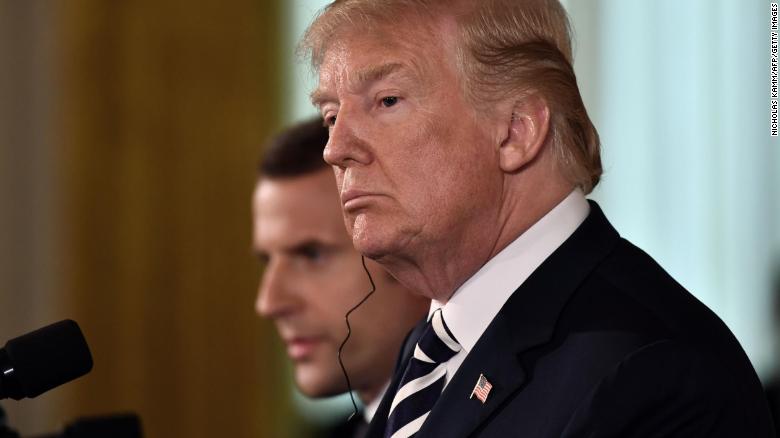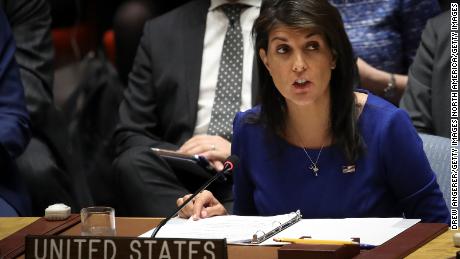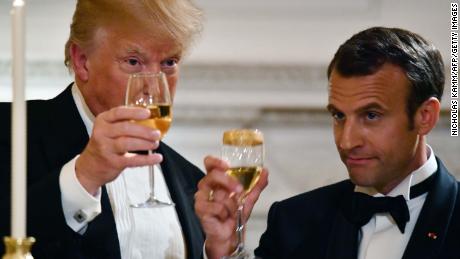Washington (CNN)US and Israeli officials issued tough warnings about Iran's activities in Syria and beyond on Thursday, in the lead-up to President Donald Trump's May 12 decision on whether to stay in the Iran nuclear deal.
The steady drumbeat appeared to reinforce signals Trump has been sending about his intent to leave the deal. And in the absence of any clear sign the White House has a "day after" plan, there are deepening concerns in some quarters that White House policy toward Tehran may be shifting from denuclearization to regime change.
"I think we are not moving toward a new agreement," said Clement Therme, a Bahrain-based research fellow for Iran at the International Institute for Strategic Studies. "I think we are moving toward a regime change policy in the US."
On Friday, Trump refused to rule out military action against Iran if it restarts its nuclear program.
"I don't talk about whether or not I'd use military force. It's not appropriate to be talking about," Trump said at a news conference with German Chancellor Angela Merkel. "But I can tell you this, they will not be doing nuclear weapons, that I can tell you."
Under the nuclear deal, Iran has pledged not to develop nuclear arms.
Trump's comments follow remarks Thursday from US and Israeli officials who laid out a litany of examples of malign Iranian behavior. Some laid the ground for potential Israeli action against Iran within Syria. Others warned the conflict could spread from there.
Speaking to lawmakers, Defense Secretary James Mattis said that Iran is bringing in increased amounts of weaponry to Syria, and suggested that Iran intends to attack Israel. Mattis said Iran's proxy activities in Syria are driving a significant risk of escalated conflict that could engulf the region.
Privately, US military officials are warning of the potential for more direct confrontation between Iran and Israel that could spiral out of control.
"The potential for escalation has grown," one defense official told CNN's Barbara Starr. The Pentagon is publicly trying to emphasize that any military moves by Iran "would take us where we don't want to go," the official said. "There is serious concern this could escalate."
In New York, Nikki Haley, the US ambassador to the UN, told the Security Council that Iran is the patron and protector of groups that use human shields, "part of Iran's overarching efforts to destabilize the region."
Danny Danon, Israel's ambassador to the UN, reminded the Security Council that the threats posed by Hezbollah, Hamas and Syria's Assad regime have one common source. "The Iranian regime is the dangerous thread that ties these threats together," he said, before he went on to denounce the Joint Comprehensive Plan of Action, as the nuclear deal is formally known.
The officials' warnings come two days after Trump signaled again that he might leave the JCPOA, which he dismissed as "insane," and just hours after the President told "Fox and Friends" that "Iran is a real problem for this country."
Trump has been a consistent critic of both the international nuclear agreement and Iran itself, but the drumbeat on Tehran has taken on a different tenor with staff changes at the White House.
The new National Security Advisor John Bolton has long advocated regime change in Iran, and he is matched in his hostility toward Tehran by the new Secretary of State Mike Pompeo.
Indeed, while Pompeo was still the nominee to be Secretary, Sen. Rand Paul, the Kentucky Republican with staunchly anti-interventionist foreign policy views, said that Pompeo "loved the Iraq War so much" that he was "ready for a war with Iran next."
Bolton, speaking to a crowd of Iranian dissidents in 2017, called the nuclear deal "inherently flawed" and said "the declared policy of the United States of America should be the overthrow of the Mullahs' regime in Tehran."
"The behavior and the objectives of the regime are not going to change and therefore the only solution is to change the regime itself," Bolton told the crowd, "and that's why before 2019 we here will celebrate in Tehran."
Bolton and Pompeo have replaced officials who were seen as more moderating influences on Trump, including former Secretary of State Rex Tillerson and former national security adviser H.R. McMaster -- neither a friend of Tehran.
"Some of the buffers around Trump that kept him from going to an extreme hawkish position are now gone," said Trita Parsi, president of the National Iranian American Council, "and he's going to be surrounded by people who will encourage those worst instincts."
The staff changes and the sense it is increasingly likely the US will leave the nuclear deal means "there is a considerable likelihood" that the administration may be shifting to a policy that's more oriented around regime change, Parsi said. "Mindful of the longstanding position of Bolton on that matter, as an advocate of regime change, an advocate of military action," he said.
Administration officials point the finger for the Middle East's problems squarely at Iran. Mattis told lawmakers that Iran was using Syria as a base to spread trouble and said it had Israel in its sights. Israel, Mattis said, would punch back.
"We have seen them trying to bring advanced weaponry into Syria on its way to Lebanese Hezbollah in southern Lebanon," Mattis said. "Israel is not going to wait until those missiles are in the air. Will it be cataclysmic? I hope not, I hope Iran pulls back."
Several US military officials said they expect Israel will strike any new Iranian targets following the recent weapons shipments. But rising Iranian rhetoric is leaving them concerned that Iran might engage in either a preemptive or retaliatory strike against Israel, sparking a new conflict inside Syria that could set fire to the region.
"The potential for escalation has grown," one defense official told CNN. The Pentagon is publicly trying to emphasize that any military moves by Iran "would take us where we don't want to go," the official said. "There is serious concern this could escalate."
The Iranian ambassador to the UN, Gholamali Khoshroo, told the Security Council that "the Iran-phobic, and hysterical statements we have heard today and in recent months are being actively perpetuated by those who are badly in need of creating an imaginary enemy to sell their "beautiful weapons" and those who entrench their aggressions through using such weapons. It is a dirty business that has nothing to do with peace and security in the Middle East."
In his remarks to the UN Security Council, Danon, the Israeli ambassador to the UN, tied Iran's backing for Hezbollah, Hamas and the Syrian regime to the nuclear deal, saying that sanctions relief from the deal has "reinforced Iran's role as the largest state-sponsor of terrorism in the world."
He noted that in two and a half weeks, Trump will make his decision on the nuclear deal, saying that Trump "knows we must change the course and we must do it now."







